|
|
|
Sort Order |
|
|
|
Items / Page
|
|
|
|
|
|
|
| Srl | Item |
| 1 |
ID:
089362
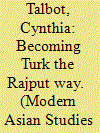

|
|
|
|
|
| Publication |
2009.
|
| Summary/Abstract |
The Kyamkhanis were a small Indian Muslim community who flourished in northern Rajasthan from c. 1450 to 1730. This article examines memories of the Kyamkhani past recorded in a seventeenth-century history of the ruling lineage, as a case study of both the process of Islamic expansionism in South Asia and the self-identity of rural Muslim gentry. While celebrating the ancestor who had converted to Islam generations earlier, the Kyamkhanis also represented themselves as local warriors of the Rajput class, an affiliation that is considered exclusively Hindu in India today. Their history was written in a local literary language, Braj Bhasa, rather than in the more cosmopolitan Persian that was widely used by Muslim elites at the time. The Kyamkhanis of the early modern era thus negotiated multiple social and cultural spheres, simultaneously participating in the local/vernacular as well as global/cosmopolitan arenas.
|
|
|
|
|
|
|
|
|
|
|
|
|
|
|
|
| 2 |
ID:
191700
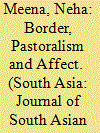

|
|
|
|
|
| Summary/Abstract |
The demarcation of the India–Pakistan border on the western side of Rajasthan in 1947 had profound implications for the pastoral communities there. Based on an archival history of the Thar desert and ethnographic fieldwork in the border villages of Rajasthan, this paper explores how pastoralists interact with the border and the bordering practices of the state. Focusing on the Raika community, the paper examines how borders impact the mobility, identity and traditional life of the pastoralists. Building on Raika memories of mobility and connections across the border, the paper argues that the interactions of the pastoralists maintain an affective relationship with this war and violence affected borderland, despite the administrative practices of surveillance, border maintenance and developmental projects that have produced an environment of insecurity and uncertainty.
|
|
|
|
|
|
|
|
|
|
|
|
|
|
|
|
| 3 |
ID:
172206
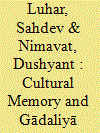

|
|
|
|
|
| Summary/Abstract |
Focused on the cultural memory of the Gādaliya Luhār community in Gujarat, this article discusses ways in which oral traditions and cultural memory among nomadic groups in India shape the identity of a community under the challenge of cultural amnesia. The Gādaliyā Luhārs claim Rājpūt status and close association with the kings of the Mewar region of Rajasthan, but experienced double cultural amnesia, first under the Mughals and later in the British Empire, which affected their identity. The article seeks to assess the authenticity of the community’s assertions of cultural memory in the light of some historical documents and asks to what extent cultural memory through oral narratives can be taken as valid evidence for understanding the cultural identity of a specific community.
|
|
|
|
|
|
|
|
|
|
|
|
|
|
|
|
| 4 |
ID:
096372
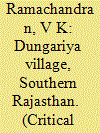

|
|
|
|
|
| Publication |
2010.
|
| Summary/Abstract |
Drawing primarily on a survey of Dungariya village in southern Rajasthan conducted in May 2007, along with interviews from mid 2009, this article provides an analytical description of household economies in a village in Kotra tehsil, Udaipur district, that is acutely impoverished by all standards of measurement.
|
|
|
|
|
|
|
|
|
|
|
|
|
|
|
|
| 5 |
ID:
115256
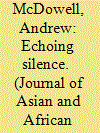

|
|
|
|
|
| Publication |
2012.
|
| Summary/Abstract |
I examine the conceptual trajectory of 'backwardness' in policy, politics and rural life to understand the term's many uses in India. I examine links forged between backwardness and governance in colonial and post-colonial commissions and committees charged with assessing and affecting Indian democracy. Multiple commissions add confusion and ambiguity, setting a variable tone of backwardness in contemporary policies, citizens' experience and claims-making. I examine the multiple voices that backwardness fosters and silences, engaging debates about mass politics, subjectivity, development and governance.
|
|
|
|
|
|
|
|
|
|
|
|
|
|
|
|
| 6 |
ID:
176583
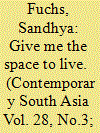

|
|
|
|
|
| Summary/Abstract |
May 2015 witnessed the Dangawas massacre in Rajasthan’s Nagaur district, one of the most brutal caste atrocities in recent Indian history, which resulted in the death of five Dalits of the Meghwal caste at the hands of a Jat mob. Across Rajasthan, the violence of Dangawas, which marked the culmination of a decades-long land conflict, has become synonymous with the continuing reality of caste-based violence and the law that is meant to address it: The 1989 SC/ST Prevention of Atrocities Act. However, Meghwal survivors in Dangawas often articulate scepticism about the ability of law to provide them with a true sense of restitution. Emphasising a desire for social space (jagah), which they map onto the land at the root of the bloodshed, Dangawas’ Meghwal survivors are caught in a post-traumatic moment marked by fear of further suffering. The memory of inconceivable violence, which has left them alienated in a divided village, has not only made renewed attempts of assertion, and demands for radical justice temporarily inconceivable, but has also led Dangawas’ survivors to ask questions about their own agency and the meaning of sociality in an environment where members of a dominant caste still see themselves as guarantors of economic and social belonging.
|
|
|
|
|
|
|
|
|
|
|
|
|
|
|
|
| 7 |
ID:
040811
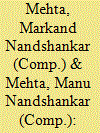

|
|
|
|
|
| Publication |
New Delhi, Usha Publications, 1985.
|
| Description |
xv, 466p.hbk
|
|
|
|
|
|
|
|
|
|
|
|
Copies: C:1/I:0,R:0,Q:0
Circulation
| Accession# | Call# | Current Location | Status | Policy | Location |
| 025798 | 954/MEH 025798 | Main | On Shelf | General | |
|
|
|
|
| 8 |
ID:
128963
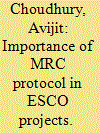

|
|
|
| 9 |
ID:
041722
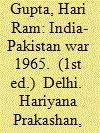

|
|
|
|
|
| Edition |
1st ed.
|
| Publication |
DelhI, Hariyana Prakashan, 1967.
|
| Description |
xxii, 400p.hbk
|
| Contents |
Vol. I
|
|
|
|
|
|
|
|
|
|
|
|
Copies: C:1/I:0,R:0,Q:0
Circulation
| Accession# | Call# | Current Location | Status | Policy | Location |
| 000200 | 954.9045/GUP 000200 | Main | On Shelf | General | |
|
|
|
|
| 10 |
ID:
061309
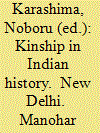

|
|
|
|
|
| Publication |
New Delhi, Manohar Publishers, 1999.
|
| Description |
ix, 271p.Hbk
|
| Series |
Japanese studies on South Asia; no.2
|
| Standard Number |
8173043264
|
|
|
|
|
|
|
|
|
|
|
|
Copies: C:1/I:0,R:0,Q:0
Circulation
| Accession# | Call# | Current Location | Status | Policy | Location |
| 044082 | 954/KAR 044082 | Main | On Shelf | General | |
|
|
|
|
| 11 |
ID:
097137
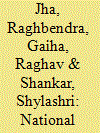

|
|
|
|
|
| Publication |
2010.
|
| Summary/Abstract |
This paper presents results on the participation of rural workers in the National Rural Employment Guarantee Programme based on a pilot survey of three villages in the Chittoor district, Andhra Pradesh (AP), India. These villages are Kaligiri, Obulayyapale and Reddivaripalle, and they were surveyed in December 2007. In contrast to an earlier study of ours on Rajasthan, Scheduled Castes (SCs) and Scheduled Tribes (STs) participated in higher numbers in AP, but in both states these groups participated for slightly lower spells than the residual group of 'Others'. We find that AP performed better than Rajasthan in terms of targeting poorer caste and income groups such as SCs, STs and landless households. The number of days worked on average was much higher than suggested by other assessments. Our econometric analysis further reinforces the view that disadvantaged groups are not only more likely to participate but also for longer spells. Thus the performance of the National Rural Employment Guarantee Programme has been far from dismal.
|
|
|
|
|
|
|
|
|
|
|
|
|
|
|
|
| 12 |
ID:
163585


|
|
|
|
|
| Summary/Abstract |
Rural employment generation was initiated in India through the National Rural Employment Guarantee Act (NREGA) in 2005 and related NREGS schemes, to provide better social and food security to socially and economically depressed rural workers. By now, the implementation of this scheme is known to be not equally satisfactory throughout India, with significant variations in different states and localities. This article, based on intensive fieldwork over 1 year in remote villages of Deogarh and Bhim blocks of Rajasamand district, explores the functioning of the scheme in rural Rajasthan. It identifies three important roadblocks to effective NREGA implementation and analyses their impact: persistence of caste-based inequalities and social interactions among different groups of rural people, differential occupational interests of potential workers and lack of initiative of the respective panchayats.
|
|
|
|
|
|
|
|
|
|
|
|
|
|
|
|
| 13 |
ID:
141237
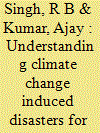

|
|
|
|
|
| Summary/Abstract |
The global climate is changing at rates that are unprecedented in recent human history and faster than the ability of natural system to adapt. Climate change is increasingly recognized as a critical challenge to ecological health, human well-being, livelihood security and future development (Singh and Heitala, 2014), as understood by the award of the Nobel Peace Prize for 2007 to the Intergovernmental Panel on Climate Change (IPCC) (Leary et al., 2008). The risks of climate change and extreme events such as drought and flood have substantial impacts on economy and natural systems. Agriculture, livestock and water resources are among the most vulnerable systems. According to Sen Roy and Singh, 2002, changing climate elements and their extremes will significantly alter productivity in agriculture and forest ecosystem, which in turn will affect the socio-economic conditions of many societies. Climate change is expected to increase the frequency and intensity of current hazards and the probability of extreme events, and also to spur the emergence of new hazards (Nicholls and Lowe, 2006). Extreme events within the variability of the climate system are, by far, the largest cause of natural disasters worldwide each year (Kininmonth, 2004). Therefore, resilience and adaptive capacity of traditional networks and land use systems to cope with climate variability/extremes are weakening, while frequency and magnitude of climate variability and land use intensity are in rise. Thus, it is important to understand the phenomenon of climate change and associated vulnerability of different sectors, regions and people.
|
|
|
|
|
|
|
|
|
|
|
|
|
|
|
|
|
|
|
|
|